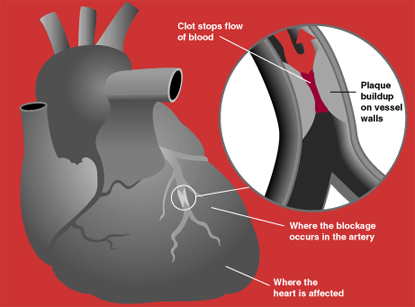|
Prevent Heart Attacksage-well.org > prevent age related diseases > prevent heart attacks 
The section of preventing age-related conditions cannot be complete without an article on how to prevent heart attacks. I was just watching a program on the television called the Angina Monologues which aims to increase awareness of the fact that women die of heart attacks as well as men. In the first five minutes I learned that one in three of both sexes are likely to die from a heart attack. I had no idea that the figure was so high. But I do know that heart attacks are a leading killer in both sexes once women have passed the menopause. Although the number of attacks is greater in men when they are younger, the protection which women have until the menopause decreases after this event and women are then as likely as men to have an attack. In part because women have heart attacks at older ages than men do, women are more likely to die from an attack within a few weeks, according to the Genetec Heart Attack Fact Sheet.
Measures to Prevent Heart AttacksThere is much you can do to prevent heart attacks and improve your heart health in the long term. Stop smoking - this might be one of the most important decisions of your life if you want to live to a ripe old age. Smoking can raise your risk of CHD and heart attack. Ask your doctor for advice and go to the pages on age-well.org on how you can quit smoking. Also try to avoid breathing in second-hand smoke through passive smoking. If you suffer from high blood pressure read the advice on age-well.org on how to control this condition. If your blood cholesterol is too high read the advice on age-well.org about how to bring this to healthy levels. Read our advice on Healthy Eating for Healthy Aging, but specifically read our pages about lowering your blood pressure with the DASH diet. All of these resources provide general information about healthy eating. Controlling your weight wil also lower your risk of CHD and help prevent heart attacks and strokes. If you are obese or even only slightly overweight, especially if this extra weight is around your middle, ask your doctor to suggest a weight-loss program that includes diet and physical activity or visit our pages about Controlling Your Weight. Be as physically active as you can. Physical activity can improve your fitness level and your health. Talk with your doctor about what types of activity are safe for you. For more information about physical activity, go to our page Exercise well.
What Causes Heart Attacks
(Photo: Wikimedia Commons in the public domain provided by the United States Federal Government) If we are going to be able to prevent heart attacks in both sexes, it is necessary, first of all to know what causes them. Oxygen from the air we breath is taken to the heart muscle and other organs of the body through our circulatory system. When the flow of blood is obstructed, for whatever reason, we are having a heart attack and if the flow does is not restored rapidly, part of the heart muscle will start to die.
Coronary Heart Disease Arterioslerosis or Atherosclerosis Blood Clots If the blockage is not treated rapidly enough, the area of heart muscle which is irrigated by the artery begins to die as scar tissue replaces the healthy tissue and may lead to long-term complications. Spasms in the Coronary Artery Symtoms of Heart AttackThe symptoms of a heart attack include:
The Need for SpeedEach year, about 7.1 million people die each year due to coronary heart disease and CHD, which often results in heart attacks, is the leading killer of both sexes in the United States. Many more people could survive or recover better from heart attacks if they got help faster. Of the people who die from heart attacks, about half die within an hour of the first symptoms and before they reach the hospital. Therefore, If you think that you or someone else is having a heart attack, call for an ambulance immediately as rapid intervention is absolutely necessary. Do not attempt to drive yourself to the hospital if you think that you are having a heart attack, call an ambulance so the paramedics can work on you if your condition deteriorates and to avoid causing a road accident.
age-well.org > prevent age related diseases > prevent heart attacks |
Translate this Site
Search this Site
List of Conditions
|
Alcoholic Liver
|
|
Alzheimers Disease
|
|
Arterioslerosis
|
|
Age-Related Cancer
|
|
Cataracts
|
|
Cholesterol
|
|
Colds and Flu
|
|
Depression
|
|
Diabetes
|
|
Dementia
|
|
Dry Eye
|
|
Enlarged Prostate
|
|
Fibromyalgia
|
|
Glaucoma
|
|
Hair Loss
|
|
Halitosis
|
| Heart Attack
|
| Herniated Disc
|
|
High Blood Pressure
|
|
Incontinence
|
|
Influenza
|
|
Lower Back Pain
|
|
Macular Degeneration
|
|
Menopause
|
|
Osteoarthritis
|
Osteoporosis
|
|
Parkinson's Disease
|
|
Peri-Menopause
|
|
Presbycusis
|
|
Presbyopea
|
|
Prediabetes
|
|
Sarcopenia
|
|
Stroke
|
|
Shingles
|
|
Swineflu
|
Develop Smart Habits
|
Lose Extra Weight
|
|
Lose Bellyfat
|
|
Quit Smoking
|
|
Reduce Alcohol
|
|
Get Enough Sleep
|
|
Eat Healthily
|
|
Cut Down on Salt
|
|
Cut down on sugar
|
|
Avoid Transfats
|
|
Follow the DASH Diet
|
|
Drink Plenty of Water
|
|
Exercise Regularly
|
|
Manage Stress
|
|
Get Your 5 a Day
|
| Eat a Healthy Breakfast
|
|
Get Enough Calcium
|
|
Practice Good Oral Hygiene
|
|
Think Positive
|
Healthy Digestion
|
The Digestive System
|
|
The Intestines
|
|
Prevent Constipation
|
About this Site








